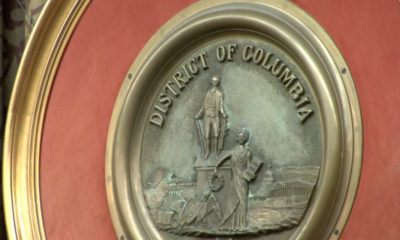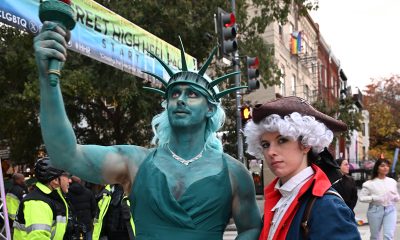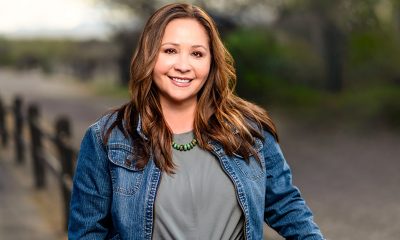Local
Can the LGBT vote rescue Mendelson?
In shocker, pro-gay incumbent trails after ‘political identity theft’
A Washington Post poll showing that the largely unknown D.C. shadow senator, Michael D. Brown, is leading incumbent Council member Phil Mendelson by 17 points in the at-large City Council race has shocked the city’s political establishment and raised the question of whether LGBT voters could save Mendelson from defeat.
Virtually all political observers agree that Brown’s lead over Mendelson, by a margin of 38 to 21 percent among registered Democrats, is due to voter confusion over Brown’s name, which is the same as that of incumbent D.C. Council member Michael A. Brown (I-At-Large).
The Post poll found that 29 percent of respondents said they were undecided in the at-large Council race among candidates running in the Sept. 4 Democratic primary.
The better-known Michael A. Brown, who enjoys widespread support across the city, is not running for re-election this year and has endorsed Mendelson. At a news conference Tuesday, he accused Michael D. Brown of engaging in “political identity theft” to capitalize on the name confusion. Michael D. Brown is listed on the ballot only as “Michael Brown.”
Michael D. Brown did not immediately return a call seeking comment. At a candidates’ forum earlier this year, he expressed support for LGBT equality, including same-sex marriage. Brown, a Democratic Party activist and political consultant, isn’t actively campaigning and has raised only a token amount of funds for his candidacy.
The poll, released by the Post on Tuesday, shows that gay former city parks and recreation director Clark Ray, who is also running for the at-large seat, garnered only 7 percent support from voters eligible to cast their ballots in the Sept. 14 Democratic primary.
With Council member Brown and mayoral candidate Vincent Gray, chairman of the City Council, endorsing Mendelson and participating in an aggressive campaign to overcome the name confusion, some political observers think Mendelson may have a shot at overtaking shadow senator Brown to win the race by a narrow margin.
That means LGBT voters as well as other voters supporting Ray could provide Mendelson with a razor-thin margin needed to win re-election if they switch sides in the race, according to LGBT activists following the contest.
“I think that would be the best situation,” said gay Democratic activist Phil Pannell, in urging Ray backers to vote for Mendelson. “I cannot see Clark picking up the votes needed to win. Phil Mendelson has been not just a friend and advocate for our community, he’s been a true champion,” said Pannell.
Many LGBT activists have said they would have backed Ray if he had run against someone other than Mendelson, who is widely recognized as a longtime supporter of LGBT rights and a lead supporter of the city’s same-sex marriage law.
The Gertrude Stein Democratic Club, the city’s largest LGBT political group, endorsed Mendelson over Ray. And the Gay and Lesbian Activists Alliance, a non-partisan group, gave Mendelson a rating score on LGBT related issues of +10, the group’s highest score. Ray received a GLAA rating of +5.5.
Ray, meanwhile, said he will continue to campaign for votes and push for the LGBT and non-LGBT issues he’s been running on since he entered the race more than a year ago.
“I got into this with a clear conscience that it was going to be a tough race and I am certainly not going to step out of it with 14 to 15 days to go,” he told the Blade Tuesday.
Gay Democratic activist Peter Rosenstein, one of Ray’s campaign advisers, said the name confusion over shadow senator Michael Brown also has hurt Ray. According to Rosenstein, many voters mistakenly supporting the “wrong Brown” would have voted for Ray and may still do so if the name confusion issue is resolved.
In what some political observers say is yet another ironic twist in the at-large Council race, a Mendelson defeat on Sept. 14 could make it more difficult for Ray to win another at-large seat on the Council in an expected special election in 2011.
Council member Kwame Brown (D-At-Large) is expected to win his race for the Council Chair seat being vacated by Vincent Gray, who is leading Mayor Adrian Fenty in the city’s mayoral contest. A win by Kwame Brown would create a vacancy in his at-large seat, which would be filled in a special election next year.
Many LGBT activists said they would strongly back Ray for that seat, and Ray has hinted that he would consider running for the seat if he lost his race against Mendelson. But if Mendelson loses to shadow Sen. Brown in the Sept. 14 primary, many political observers expect him to enter the race for Kwame Brown’s seat in the special election next year, making it far more difficult for Ray to win the seat.
Gay GOP candidates
dispute low GLAA ratings
Two gay Republicans who are running for D.C. City Council seats this year complained that the Gay and Lesbian Activists Alliance exhibited partisan bias against the two Republicans by assigning them rating scores lower than what they believe they deserve.
The local gay GOP group Log Cabin Republicans and the gay chair of the D.C. Republican Party, Robert Kabel, backed up the two candidates’ allegation.
“It’s outrageous that GLAA thinks they can rate two gay men so low for ‘gay-supportiveness’ and get away with it without anyone asking questions,” said D.C. Log Cabin President Robert Turner in a press release.
Marc Morgan, who is running for the Ward 1 Council seat, received a GLAA rating of +3. Tim Day, who is running for Council in Ward 5, received a GLAA rating of +1.5.
The GLAA rating system includes scores ranging from -10 to +10 based on the group’s evaluation of candidates’ responses to a GLAA questionnaire and their record on LGBT and other issues the group deems important.
GLAA Vice President Rick Rosendall disputed complaints that Morgan and Day were singled out for partisan bias in a statement on the group’s online forum. He said their questionnaire responses did not show a full understanding of some of the complex issues raised in the questionnaire, even though the two expressed support for LGBT causes and concerns.
GLAA noted that Day lost points when he appeared to state on the questionnaire that he supports a proposal by D.C. Council member Yvette Alexander calling for adding a “conscience” clause to the city’s same-sex marriage law. The clause, which was defeated in committee, would have allowed businesses providing wedding-related services that are not linked to religious institutions to refuse on religious or moral grounds to provide those services for same-sex weddings.
Morgan told the Blade that GLAA apparently wasn’t aware of his longstanding record of support on LGBT issues in other states, such as Arizona, where he worked on efforts to oppose ballot measures seeking to ban same-sex marriage. Morgan said he and Day plan to submit a revised questionnaire to GLAA for the November general election, which he said would better elaborate on their positions and records.
GLAA allows candidates running in the general election to revise their questionnaires, and the group sometimes makes changes in its rating scores based on changed questionnaire responses.
Morgan and Day are running unopposed in the Sept. 14 Republican primary. Morgan would be up against gay D.C. Council member Jim Graham (D-Ward 1) in the November general election if Graham wins his primary race on Sept. 14. Graham received a +10 GLAA rating. Day would be the challenger to Council member Harry Thomas (D-Ward 5) if Thomas wins the Democratic nomination in the primary. Thomas received a GLAA rating of +6.

In an official statement released at the reveal event Capital Pride Alliance described its just announced 2026 Pride theme of “Exist, Resist, Have the Audacity” as a “bold declaration affirming the presence, resilience, and courage of LGBTQ+ people around the world.”
The statement adds, “Grounded in the undeniable truth that our existence is not up for debate, this year’s theme calls on the community to live loudly and proudly, stand firm against injustice and erasure, and embody the collective strength that has always defined the LGBTQ+ community.”
In a reference to the impact of the hostile political climate, the statement says, “In a time when LGBTQ+ rights and history continue to face challenges, especially in our Nation’s Capital, where policy and public discourse shape the future of our country, together, we must ensure that our voices are visible, heard, and unapologetically centered.”
The statement also quotes Capital Pride Alliance CEO and President Ryan Bos’s message at the Reveal event: “This year’s theme is both a declaration and a demand,” Bos said. “Exist, Resist, Have Audacity! reflects the resilience of our community and our responsibility to protect the progress we’ve made. As we look toward our nation’s 250th anniversary, we affirm that LGBTQ+ people have always been and always will be part of the United States’s history, and we will continue shaping its future with strength and resolve,” he concluded.
District of Columbia
Capital Pride board member resigns, alleges failure to address ‘sexual misconduct’
In startling letter, Taylor Chandler says board’s inaction protected ‘sexual predator’

Taylor Lianne Chandler, a member of the Capital Pride Alliance Board of Directors since 2019 who most recently served as the board’s secretary, submitted a letter of resignation on Feb. 24 that alleges the board has failed to address instances of “sexual misconduct” within the Capital Pride organization.
The Washington Blade received a copy of Chandler’s resignation letter one day after she submitted it from an anonymous source. Chandler, who identifies as transgender and intersex, said in an interview that she did not send the letter to the Blade, but she suspected someone associated with Capital Pride, which organizes D.C.’s annual LGBTQ Pride events, “wants it out in the open.”
“It is with a heavy heart, but with absolute clarity, that I submit my resignation from the Capital Pride Alliance Board of Directors effective immediately,” Chandler states in her letter. “I have devoted nearly ten years of my life to this organization,” she wrote, pointing to her initial involvement as a volunteer and later as a producer of events as chair of the organization’s Transgender, Gender Non-Conforming, and Intersex Committee.
“Capital Pride once meant something profound to me – a space of safety, visibility, and community for people who have often been denied all three,” her letter continues. “That is no longer the organization I am part of today.”
“I, along with other board members, brought forward credible concerns regarding sexual misconduct – a pattern of behavior spanning years – to the attention of this board,” Chandler states in the letter. “What followed was not accountability. What followed was retaliation. Rather than addressing the substance of what was reported, officers and fellow board members chose to chastise those of us who came forward.”
The letter adds, “This board has made its priorities clear through its actions: protecting a sexual predator matters more than protecting the people who had the courage to come forward. … I have been targeted, bullied, and made to feel like an outsider for doing what any person of integrity would do – telling the truth.”
In response to a request from the Blade for comment, Anna Jinkerson, who serves as chair of the Capital Pride board, sent the Blade a statement praising Taylor Chandler’s efforts as a Capital Pride volunteer and board member but did not specifically address the issue of alleged sexual misconduct.
“We’re also aware that her resignation letter has been shared with the media and has listed concerns,” Jinkerson said in her statement. “When concerns are brought to CPA, we act quickly and appropriately to address them,” she said.
“As we continue to grow our organization, we’re proactively strengthening the policies and procedures that shape our systems, our infrastructure, and the support we provide to our team and partners,” Jinkerson said in her statement. “We’re doing this because the community’s experience with CPA must always be safe, affirming, empowering, and inclusive,” she added.
In an interview with the Blade, Chandler said she was not the target of the alleged sexual harassment.
She said a Capital Pride investigation identified one individual implicated in a “pattern” of sexual harassment related behavior over a period of time. But she said she was bound by a Non-Disclosure Agreement (NDA) that applies to all board members and she cannot disclose the name of the person implicated in alleged sexual misconduct or those who came forward to complain about it.
“It was one individual, but there was a pattern and a history,” Chandler said, noting that was the extent of what she can disclose.
“And I’ll say this,” she added. “In my opinion, with gay culture sometimes the touchy feely-ness that goes on seems to be like just part of the culture, not necessarily the same as a sexual assault or whatever. But at the same time, if someone does not want those advances and they’re saying no and trying to push you away and trying to avoid you, then it makes it that way regardless of the culture.”
When asked about when the allegations of sexual harassment first surfaced, Chandler said, “In the past year is when the allegation came forward from one individual. But in the course of this all happening, other individuals came forward and talked about instances – several which showed a pattern.”
Chandler’s resignation comes about five months after Capital Pride Alliance announced in a statement released in October 2025 that its then board president, Ashley Smith, resigned from his position on Oct. 18 after Capital Pride became aware of a “claim” regarding Smith. The statement said the group retained an independent firm to investigate the matter, but it released no further details since that time. Smith has declined to comment on the matter.
When asked by the Blade if the Smith resignation could be linked in some way to allegations of sexual misconduct, Chandler said, “I can’t make a comment one way or the other on that.”
Chandler’s resignation and allegations come after Capital Pride Alliance has been credited with playing the lead role in organizing the World Pride celebration hosted by D.C. in which dozens of LGBTQ-related Pride events were held from May through June of 2025.
The letter of resignation also came just days before Capital Pride Alliance’s annual “Reveal” event scheduled for Feb. 26 at the Hamilton Hotel in which the theme for D.C.’s June 2026 LGBTQ Pride events was to be announced along with other Pride plans.
District of Columbia
Capital Stonewall Democrats elect new leaders
LGBTQ political group set to celebrate 50th anniversary

Longtime Democratic Party activists Stevie McCarty and Brad Howard won election last week as president and vice president for administration for the Capital Stonewall Democrats, D.C.’s largest local LGBTQ political organization.
In a Feb. 24 announcement, the group said McCarty and Howard, both of whom are elected DC Advisory Neighborhood Commissioners, ran in a special Capital Stonewall Democrats election to fill the two leadership positions that became vacant when the officers they replaced resigned.
Outgoing President Howard Garrett, who McCarty has replaced, told the Washington Blade he resigned after taking on a new position as chair of the city’s Ward 1 Democratic Committee. The Capital Stonewall Democrats announcement didn’t say who Howard replaced as vice president for administration.
The group’s website shows its other officers include Elizabeth Mitchell as Vice President for Legislative and Political Affairs, and Monica Nemeth as Treasurer. The officer position of secretary is vacant, the website shows.
“As we look toward 2026, the stakes for D.C. and for LGBTQ+ communities have never been clearer,” the group’s statement announcing McCarty and Howard’s election says. “Our 50th anniversary celebration on March 20 and the launch of our D.C. LGBTQ+ Voter’s Guide mark the beginning of a major year for endorsements, organizing, and coalition building,” the statement says.
McCarty said among the organization’s major endeavors will be holding virtual endorsement forums where candidates running for D.C. mayor and the Council will appear and seek the group’s endorsement.
Founded in 1976 as the Gertrude Stein Democratic Club, the organization’s members voted in 2021 to change its name to Capital Stonewall Democrats. McCarty said the 50th anniversary celebration on March 20, in which D.C. Mayor Muriel Bowser and members of the D.C. Council are expected to attend, will be held at the PEPCO Gallery meeting center at 702 8th St., N.W.




















